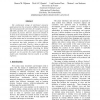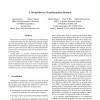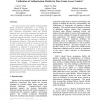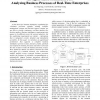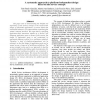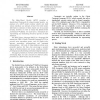EDOC
2003
IEEE
14 years 4 months ago
2003
IEEE
The architectural design of distributed enterprise applications from the viewpoints of different stakeholders has been proposed for some time, for example, as part of RM-ODP and I...
EDOC
2003
IEEE
14 years 4 months ago
2003
IEEE
Model-driven architectures (MDA) separate the business or application logic from the underlying platform technology and represent this logic with precise semantic models. These mo...
EDOC
2003
IEEE
14 years 4 months ago
2003
IEEE
The Aspect Integrator Platform (AIP) from ABB was designed to build the next generation of industrial automation applications. This platform is part of a set of products that prov...
EDOC
2003
IEEE
14 years 4 months ago
2003
IEEE
The research vision of the Unified Component Meta Model Framework (UniFrame) is to develop an infrastructure for components that enables a plug and play component environment wher...
EDOC
2003
IEEE
14 years 4 months ago
2003
IEEE
As the desire for business intelligence capabilities for e-business processes expands, existing workflow management systems and decision support systems are not able to provide co...
EDOC
2003
IEEE
14 years 4 months ago
2003
IEEE
This paper aims at demonstrating the benefits and importance of the service concept in the model-driven design of distributed applications. A service defines the observable behavi...
EDOC
2003
IEEE
14 years 4 months ago
2003
IEEE
Distributed System design is a highly complicated and non-trivial task. The problem is characterised by the need to design multi-threaded, multi-processor, and multimedia systems....
EDOC
2003
IEEE
14 years 4 months ago
2003
IEEE
Distributed systems are inherently complex, and therefore difficult to design and develop. Experience shows that new technologies—such as components, aspects, and application f...
EDOC
2003
IEEE
14 years 4 months ago
2003
IEEE
The Meta-Object Facility (MOF) provides a standardised framework for object-oriented models. An instance of a MOF model contains objects and links whose interfaces are entirely de...
